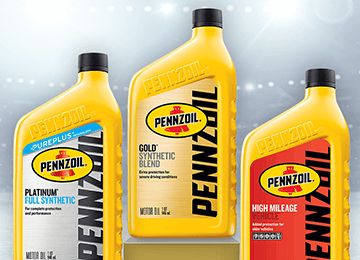
The W Means Winter
Motor oil is measured by its viscosity—basically how thick or thin it is. The higher the viscosity, the slower it flows. All motor oils are given a ratings grade by the Society for Automotive Engineers. An example is 5W30—the “W” stands for winter and the oil’s cold weather rating. The lower the W number, the better the oil will perform in colder temperatures. Typically, a 5W oil is recommended for winter use, but synthetic oils can be formulated to flow even more easily when cold. This way, they are able to pass tests that meet the 0W rating.
Synthetic vs. Conventional Motor Oil
Today’s motor oil is formulated to be 80% base oil and 20% additives. The base oil can either be conventional, synthetic, or a blend of both. And the additives can include detergents, dispersants, friction modifiers, viscosity index improvers, and more. So which is best?
- Conventional Oil: Generally speaking, this is the standard car oil—it’s affordable and meets the requirements of most manufacturers, but does contain some impurities.
- High Mileage Oil: This is a conventional motor oil that has been enhanced with special conditioning agents and additives that help reduce and prevent leaks and reduce oil consumption in older engines. If your car has more than 75,000 miles on it, this option can help it last longer.
- Synthetic Blend Oil: These oils have a dose of synthetic oil mixed with mineral oil and are a good stepping stone for drivers wanting to improve performance at a lower cost than a full synthetic. They're popular with drivers of pickups, SUVs and GM vehicles that require a Dexos rated oil.
- Full Synthetic Oil: This oil contains fewer impurities, making it ideal for today’s modern, higher performance engines. It also flows better at low temperatures and maintains peak lubricity at high temperatures, offering the best protection even if the engine does not require it.
Change It Up
Choosing the correct oil won’t matter if you’re not scheduling routine oil changes. Why? In the same way bathing keeps you clean, fresh motor oil keeps your engine clean and helps you avoid the potentially damaging effects a worn-out oil could inflict on your vehicle. If you want to maximize performance, fuel economy and, more importantly, your car’s engine life, don’t skip this important step.
The Bottom Line
A multi-viscosity 5W30 oil flows quicker in cold weather and is recommended for year-round protection, and a synthetic 5W30 multi-viscosity will provide the best protection you can get in both extremely cold weather and extremely hot engine temperatures. However, what's really important is that you follow your vehicle owner’s manual to determine the proper viscosity grade, engine oil specification and oil drain interval. You can also visit a Firestone Complete Auto Care location near you to talk to one of our oil experts. We’ll walk you through the various types of oil and why one may be more beneficial to your vehicle than another.



